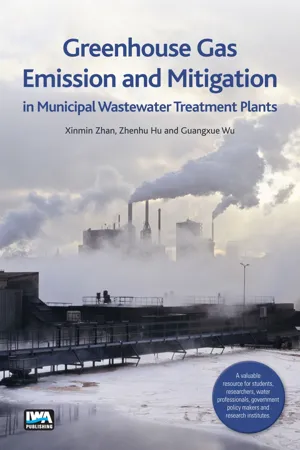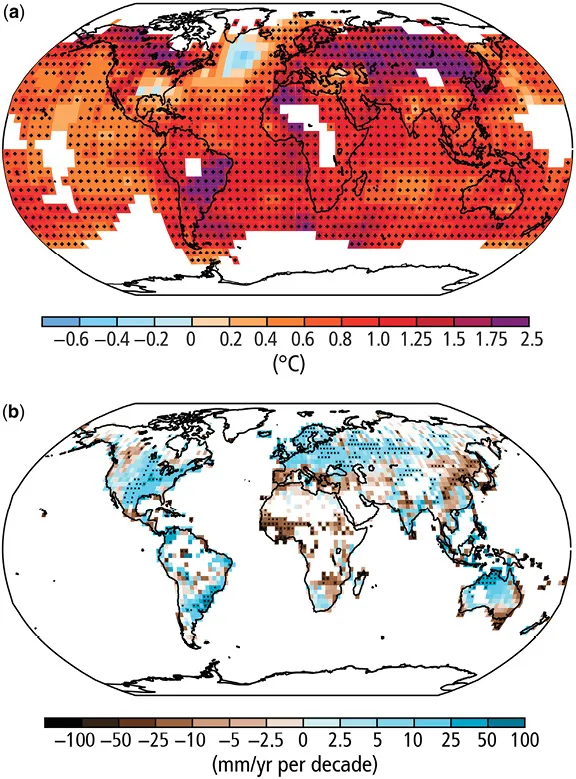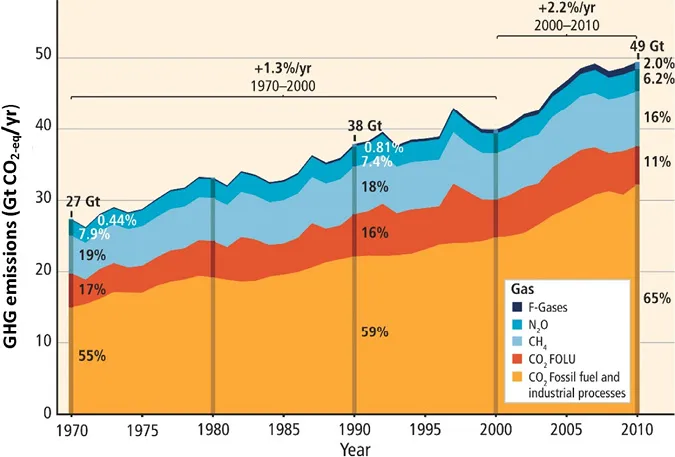
eBook - ePub
Greenhouse Gas Emission and Mitigation in Municipal Wastewater Treatment Plants
Fundamentals and a Guide to Experimental Research
- 160 pages
- English
- ePUB (mobile friendly)
- Available on iOS & Android
eBook - ePub
Greenhouse Gas Emission and Mitigation in Municipal Wastewater Treatment Plants
Fundamentals and a Guide to Experimental Research
About this book
Advanced wastewater treatment processes and novel technologies are adopted to improve nutrient removal from wastewater so as to meet stringent discharge standards. Municipal wastewater treatment plants are one of the major contributors to the increase in the global greenhouse gas (GHG) emissions and therefore it is necessary to carry out intensive studies on quantification, assessment and characterization of GHG emissions in wastewater treatment plants, on the life cycle assessment from GHG emission prospective, and on the GHG mitigation strategies.
Greenhouse Gas Emission and Mitigation in Municipal Wastewater Treatment Plants summarises the recent development in studies of greenhouse gases' (CH4 and N2O) generation and emission in municipal wastewater treatment plants. It introduces the concepts of direct emission and indirect emission, and the mechanisms of GHG generations in wastewater treatment plants' processing units. The book explicitly describes the techniques used to quantify direct GHG emissions in wastewater treatment plants and the protocol used by the Intergovernmental Panel on Climate Change (IPCC) to estimate GHG emission due to wastewater treatment in the national GHG inventory. Finally, the book explains the life cycle assessment (LCA) methodology on GHG emissions in consideration of the energy and chemical usage in municipal wastewater treatment plants. In addition, the strategies to mitigate GHG emissions are discussed.
The book provides an overview for researchers, students, water professionals and policy makers on GHG emission and mitigation in municipal wastewater treatment plants and industrial wastewater treatment processes. It is a valuable resource for undergraduate and postgraduate students in the water, climate, and energy areas; for researchers in the relevant areas; and for professional reference by water professionals, government policy makers, and research institutes.
Frequently asked questions
Yes, you can cancel anytime from the Subscription tab in your account settings on the Perlego website. Your subscription will stay active until the end of your current billing period. Learn how to cancel your subscription.
No, books cannot be downloaded as external files, such as PDFs, for use outside of Perlego. However, you can download books within the Perlego app for offline reading on mobile or tablet. Learn more here.
Perlego offers two plans: Essential and Complete
- Essential is ideal for learners and professionals who enjoy exploring a wide range of subjects. Access the Essential Library with 800,000+ trusted titles and best-sellers across business, personal growth, and the humanities. Includes unlimited reading time and Standard Read Aloud voice.
- Complete: Perfect for advanced learners and researchers needing full, unrestricted access. Unlock 1.4M+ books across hundreds of subjects, including academic and specialized titles. The Complete Plan also includes advanced features like Premium Read Aloud and Research Assistant.
We are an online textbook subscription service, where you can get access to an entire online library for less than the price of a single book per month. With over 1 million books across 1000+ topics, we’ve got you covered! Learn more here.
Look out for the read-aloud symbol on your next book to see if you can listen to it. The read-aloud tool reads text aloud for you, highlighting the text as it is being read. You can pause it, speed it up and slow it down. Learn more here.
Yes! You can use the Perlego app on both iOS or Android devices to read anytime, anywhere — even offline. Perfect for commutes or when you’re on the go.
Please note we cannot support devices running on iOS 13 and Android 7 or earlier. Learn more about using the app.
Please note we cannot support devices running on iOS 13 and Android 7 or earlier. Learn more about using the app.
Yes, you can access Greenhouse Gas Emission and Mitigation in Municipal Wastewater Treatment Plants by Xinmin Zhan,Zhenhu Hu,Guangxue Wu in PDF and/or ePUB format, as well as other popular books in Technology & Engineering & Environmental Science. We have over one million books available in our catalogue for you to explore.
Information
© IWA Publishing 2018. Xinmin Zhan, Zhenhu Hu and Guangxue Wu. Greenhouse Gas Emission and Mitigation in Municipal Wastewater Treatment Plants. DOI: 10.2166/9781780406312_001
Chapter 1
Warming climate and greenhouse gases
Xinmin Zhan, Guangxue Wu and Zhenhu Hu
1.1 WARMING CLIMATE
Climate change and global warming are two well-known terms all over the world, among the industry, academia, farmers, policymakers and the general public. The warming of our climate is evidenced by rising global temperatures, rising sea levels, diminishing ices in the Arctic Ocean and the Antarctic continent, retreating glaciers, and frequent extreme flood and drought events (NASA [National Aeronautics & Space Administration], 2017). The globally average temperature (combining the land and ocean surfaces) has had an increasing trend since 1880, with an increase of 0.85°C over the period of 1880–2012 (IPCC [Intergovernmental Panel on Climate Change], 2014). Even though we have implemented a number of actions to fight global warming, it is clear that the warming trend is continuing, as 15 of the 16 warmest years on record have taken place since 2001, and the year 2015 had a temperature 1°C or more higher the 1880–1899 average (NASA, 2017).
Oceans are always regarded as the conditioner maintaining the global temperature constant. Unfortunately, the ocean surface temperature also shows a warming tendency with the upper 75 m warmer by 0.11°C (0.05–0.13°C) per decade in the period 1971–2010 (IPCC, 2014). The upper 700 m of ocean water warmed from 1971 to 2010 (95–100% probability confidence) (IPCC, 2014) and the global oceanic temperature in the upper 700 m rose by 0.15°C between 1955 and 2016 (NODC [National Oceanographic Data Center], 2017).
The warming effects vary by region, with the effects being more obvious and significant in some regions than others (Figure 1.1). In Ireland, the observational data from five long stations show that the mean annual temperature increased by approximately 0.8°C over the period 1900–2012 (Gleeson et al. 2013).

Figure 1.1 An uneven changing global climate system ((a) observed surface temperature change from 1901 to 2012; (b) observed precipitation change from 1951 to 2010) (IPCC, 2014).
Intensive scientific research has shown that the cause of the warming climate is anthropogenic greenhouse gas emissions, which have increased significantly since the pre-industrial era (IPCC, 2014): there is a 95–100% probability that the anthropogenic increase in GHG emissions has led to the global average surface temperature increase from 1951 to 2010. Between 1750 and 2011, 2040 ± 310 Gt CO2-eq (1 Gt = 109 tonnes) was emitted to the atmosphere, half of which occurred in the last 40 years, with anthropogenic GHG emissions in 2010 reaching 49 ± 4.5 Gt CO2-eq/year. Currently, the atmospheric CO2 level is 407 parts per million, while it was 280 parts per million 250 years ago, in the mid-18th century (NASA, 2017). Total annual anthropogenic GHG emissions increased sharply after 2000, by 1.0 Gt CO2-eq per year from 2000 to 2010. The annual increase was 0.4 CO2-eq per year over the period of 1970 to 2000 (Figure 1.2). This was due to the rapid economic development in emerging and developing countries, for example China, India, and Brazil.

Figure 1.2 Total annual anthropogenic GHG emissions by gases over the period of 1970–2010 (IPCC, 2014). Note: F-Gases are fluorinated gases covered under the Kyoto Protocol, and, CO2 FOLU is CO2 emission from the Forestry and Other Land Use category (FOLU).
An increasingly warming climate will damage our natural environment and human living systems. This damage will vary from region to region but will include: loss of livelihoods, infrastructure and economic stability; increa...
Table of contents
- Cover
- Half Title
- Title Page
- Copyright Page
- Contents
- Preface
- Chapter 1: Warming climate and greenhouse gases
- Chapter 2: Greenhouse gas emissions from wastewater treatment facilities
- Chapter 3: IPCC framework for calculating greenhouse gas emissions from wastewater treatment
- Chapter 4: Measurement of direct greenhouse gas emissions in WWTPs
- Chapter 5: Methane emission and mitigation in municipal wastewater treatment plants
- Chapter 6: N2O emission during biological nitrogen removal
- Chapter 7: Life cycle assessment of a wastewater treatment plant
- Index